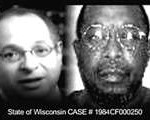Accurate & Balanced Reporting on the Wisconsin Supreme Court
The Wisconsin Supreme Court has received a fair bit of coverage from the news and editorial desks of the state’s media outlets over the past five years. Sometimes the editorial writers have criticized particular decisions in cases, sometimes particular campaign statements, and sometimes the overall structure of the court. This morning’s news story by the Madison Capital Times is the latest to decry the course of the court:
[W]hat’s certain is that the political divisions in the court, once kept behind closed doors, are now on public display. Until recently, one could hardly imagine a public meeting where one justice would accuse the chief justice of posing for ‘holy pictures,’ then addressing her as ‘kiddo,’ while another rudely dismisses a colleague’s argument as ‘ridiculous.’ ‘It’s a shame because they’re just acting like schoolchildren,’ former Justice William Bablitch says.
It’s a shame that people have such short memories, and that the Capital Times story was written in an utterly one-sided way.

 Apparently, the Wisconsin Supreme Court is not the only one sharply divided on an array of issues and fighting over questions of recusal. In Michigan,
Apparently, the Wisconsin Supreme Court is not the only one sharply divided on an array of issues and fighting over questions of recusal. In Michigan,  At last month’s
At last month’s